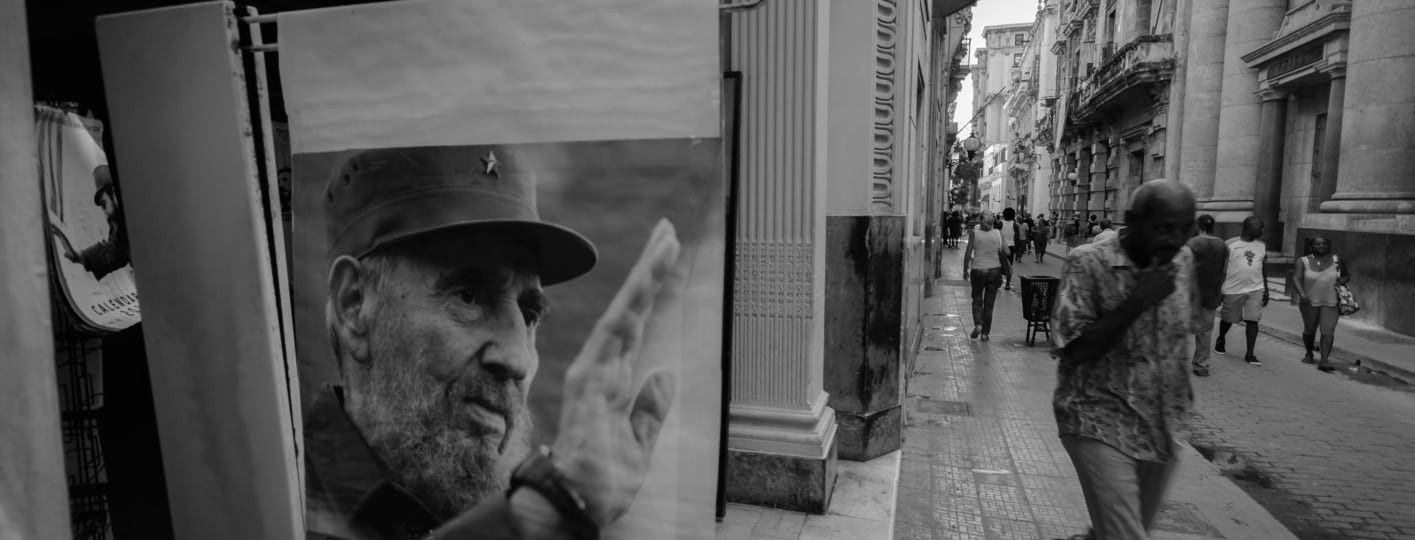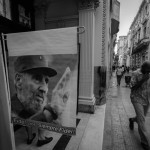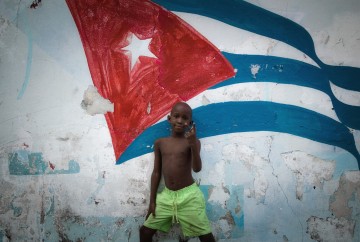Jineteros and Santeros, maybe it’s from Cuba what I least expected. The reason for writing this post is above all to anticipate the future travelers who visit the island the peculiarity (obviously without generalizing) of some of its people. I will not criticize a way of living, much less a religion. We just found it very curious and wanted to share it.
SANTEROS
We spent our days in Havana mingling with their people. Probably we met hundreds of people totally dressed in white but they went unnoticed before our ignorant eyes.
One day the lady of our private house told us that her husband was going to be “crowned saint” next year. As we are quite curious, we asked her what he meant by “crowning himself saint”.
It turns out that although the majority religion in Cuba is Catholic, almost the majority of practitioners combine it with Santería.
This polytheistic religion that worships the Orishas was brought from Africa during the era of slavery. Just as the African traditions and gastronomy left its mark on the island, the slaves maintained their religion and it was derived by mixing with Catholicism, the religion that the Spanish colonizers imposed at that time.
If you see a man or woman in Cuba dressed entirely in white, it is probably because they have crowned them as saints. Becoming saint is an act by which the person starts in Santeria. It is like the first communion of Catholics. However, there is no age for this initiation ritual. The individual decides when he is ready.
For a year after being crowned saint the person must dress completely in white, including accessories. In addition, you should shave your hair, either male or female, and always keep your head covered.
Since then, every time we see someone dressed completely in white we know the reason. The curious thing is that afterwards we have also seen santeros outside of Cuba. Probably before we also crossed paths with them but they were unnoticed for us.
Jineteros
They warned us to be careful with the Cuban picaresque, but until we were there we were not aware of how easy it is to be scammed. With the aim of trying to prevent future travelers I have prepared some anecdotes that happened to us during the trip. However I doubt the usefulness of these notes, because no matter how much we tell you, you will go and may fall in some trap of the Jineteros.
But who are the Jineteros?
I do not know if my definition will be accurate but according to what I understood after two weeks on the island, the Jineteros are those people who try to earn money and live by swindling, cheating or scratching commissions for making you buy somewhere with which they have an agreement.
We understand that the economic situation is horrible. That many families struggle to make the ends meet even with the basic needs provided by the State. That’s why I do not judge them. Anyone could probably do exactly the same in that situation. But no doubt if a friend goes to Cuba I will warn him of these little scams, so that if the Jineteros try to trick him, they do not get it. So here, friends, we leave you our experiences.
THE typewriter OF CHE GUEVARA
We were virgins just landed in Havana. It was not even 10 minutes since we left for the first time to visit the city. A marriage of very nice Cubans caught up with us. They wanted to know where we were from and of course since when we were there.
Innocents we said that we had just arrived and their eyes shined. The best business of a Jinetero is a newly landed tourist.
They asked to us if we had already gone to a restaurant where there was a Che Guevara typewriter. We said no and they offered to accompany us. Dani, who for these things is more innocent than me, agreed to go and I, who was convinced that something strange was happening, followed them.
The restaurant was a small place with a typewriter that could be Che’s or anyone’s. The marriage told us to sit down at a table and drink something. I did not feel like it and they got a little annoying. Dani finally suspected that the marriage wanted more than just being nice to us and we left. Although the couple insisted they directly asked some money to us.
THE OLYMPIC BOXING CHAMPION
This anecdote is my favorite especially because I found out that they also tried to cheat us here almost a year after our trip to Cuba.
It turns out that in our post of Havana we initially told that we met Rogelio Marcelo, gold boxing champion at the 1992 Olympic Games in Barcelona.
We also published the following video:
Ten minutes after publishing it, they wrote to tell me that this gentleman was not Rogelio Marcelo, but a Jinetero who was passing himself off as him to convince tourists to go to a restaurant and get a commission.
Indeed, the false Rogelio recommended a restaurant to which we finally did not go.
THE MOST EXPENSIVE MOJITO OF CUBA
We talked about this trick previously in the post of Havana.
While we were visiting the alley of Hamel, a very nice boy started to show the place to us. We told him that it was not necessary since we were traveling as backpackers, without a lot of money, so we could not tip him. The man insisted on showing around because he wanted us to know his culture, so we thought he would simply be a nice person.
At the end of the visit he asked us if we wanted a mojito at the bar in the same alley. Dani fell into the trap by accepting. Without even asking if we invited him, he asked for two mojitos, one for him and one for Dani. What was our surprise when the waiter charged us 7 CUC per mojito, something like three times what they usually charge in Cuba for a mojito.
This time there was also an agreement between the bar and the Jinetero, to charge more to the tourists brought by him and thus take a commission.
THE PASSENGER IS MINE
In this story I have to admit that I went through fear. It happened in Trinidad. We went to ask to the bus station if there were direct buses to Viñales and they said no. At the exit a Cuban asked us where we wanted to go and he told us that he could try to ride a shared taxi to Viñales.
He also asked to us the address of our private house. It turns out that at that precise moment we did not have the address of our private house so we told him more or less where we lived. The man told us that if he could get a car together he would come to the house to tell us.
Upon returning to our house we told the landlady and she told us that she would arrange a shared taxi for the same price that the man had told us, 30 CUC.
The other man did not go home until the same morning that we wanted to go to Viñales. Then began a strong argument between the taxi driver and the landlords of our house, because both wanted to take the commission they would earn if we rode in the taxi recommended by them. They insulted and almost fight… I think this experience helped us understand a bit better the functioning of the black money that moves in Cuba.
When I thought that the woman in my house was doing me a favour, looking for a taxi, what she was really doing was trying to get this commission. Any recommendation they make to you: another private house, a taxi driver, a restaurant, our experience says it is for taking the mentioned commission.
THE DRIVER OF VIÑALES WHO DID NOT KNOW THE STREETS OF HIS OWN TOWN
When we arrived in Viñales we showed the taxi driver the address of the private house that had been recommended to us in Trinidad. Although we did not paid anything in advance, we had already negotiated a very good price.
The man, resident of Viñales, told us that he did not know exactly where the street was, that he was going to ask. At that moment he found “coincidentally” his wife, whom he asked to explain where to find the street.
The woman looking at the address replied:
– Private houses there? That is on the outskirts of Viñales, which tourist would like to stay there?
And the taxi driver told us that he knew of a private house empty on the main avenue and could take us to see it.
As we already had a master in Cuban picaresque we told him to take us to the private house that we already had. Finally it turned out that it was 5 minutes walking from the main square of Viñales and that all the play he did with his wife was for trying to take us to another private house where he would charge a commission.
THE CHEAPER WATER BOTTLED OF ALL CUBA
Our lady in the private house in Viñales, which I do not recommend at all, told us that she was selling water cheaper than anywhere else in Viñales. Every day she sold us a liter and a half bottle for 1 CUC, while in other places they were charging 2 CUC.
We did not care; but one day, with the bottle on the table, we saw something moving inside. It was not a bug or anything, it just was not bottled water. We suspected that she would have refilled it from the tap.
The next day she tried again to sell us a bottle and there we found that the safety lock on the bottles was open. Of course she was selling us tap water. When we told her she said yes, she filled them but from a 5-liter bottle of water. We honestly do not want to know where she got the empty bottles. I know that she didn’t sterilize them because they still had the outer label of the new bottles. Obviously we did not buy her water again.
The worst thing is that this lady already knew the problem I previously went through in Trinidad when I had to use travel insurance in Cuba and still had no qualms about cheating. Here is a comparison of the best travel insurance companies in the market.
CONCLUSIONS
And with this I end this post where on one hand we talked about what we learned from Santeria in Cuba, this religion that at least for us was a great unknown and on the other we explained different anecdotes that happened to us dealing with Jineteros.
Both themes are an intrinsic part of Cuban culture and despite the fact that Jineteros ended up being a nightmare that we only escaped on the plane back from Cuba, they are something you have to deal with when visiting this country.
I love Cuba, I love its nature and its landscapes. Maybe I closed myself with some people more than in other places because of the fear of being constantly scammed. However, overcoming the fear barrier, I also met authentic and good-hearted people. People who gave without expecting anything in return.
I hope that one day soon, when the economic situation improves, these Cubans who try to take advantage can see in foreigners a way to enrich themselves from other cultures; not considering foreigners as mere “Dollars with Legs” to draw up every penny. I’m sure it will be like that.











